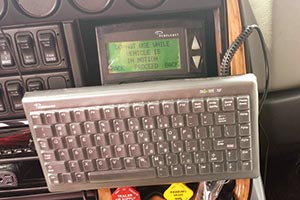Canada Plans to Require Use of Electronic Logs

This story appears in the Aug. 22 print edition of Transport Topics.
Truck drivers in Canada will likely soon be required to be outfitted with electronic logging devices, with full implementation of a rule expected before the end of the decade, according to a Transport Canada official.
In the United States, a final rule requires interstate truckers to use an e-log to record hours of service by December 2017.
“It’s a significant impetus for us to be in sync with the U.S. since there’s such a huge exchange of motor carrier activity between the countries,” Brian Orrbine, chief of Transport Canada’s Motor Carriers Safety Division, told Transport Topics. “We prefer not to have a situation where the U.S. comes out with a ruling that is so different from Canada’s that it’s almost impossible for motor carriers to try to deal with that.”
Transport Canada recently began the process with what’s called a pre-consultation document. Stakeholder comments will be accepted until Sept. 16. The next steps will be Canada Gazette Part I, which is akin to the Federal Motor Carrier Safety Administration’s notice of proposed rulemaking, and Part II, which is akin to a final rule. Both are likely in 2017, with compliance to follow perhaps as long as two years later.
“The technology has been out there for a decade, but it has really changed,” Orrbine said. “In the early days, the device was hard-wired and had to be attached to the engine. Now it can be Bluetooth. They’re a lot easier to use. And where they used to cost thousands of dollars, now you can pick one up for $300 to $400 [Canadian].”
Mark Seymour, CEO of the Kriska Transportation Group in Ontario, is on board with ELDs. Two of Kriska’s four companies, covering 450 trucks, have been ELD-compliant for more than a year. Seymour said the other two firms, which have 200 trucks between them, will be ELD-compliant within a year.
“We didn’t push ELDs on people,” Seymour, the former chairman of the Canadian Trucking Alliance, told TT. “We introduced it at a rate that people were comfortable with, and the feedback has been very, very positive. Drivers appreciate the simplicity of it. I campaign for ELDs every chance I get.”
Orrbine said that drivers without ELDs spend up to 23 minutes per day recording in their logbooks, with staffers at carriers spending more time than that plowing through piles of logbooks.
Evan MacKinnon is CEO of MacKinnon Transport Inc. of Ontario, which made them standard in 2008 after an audit revealed many logbook falsifications.
“We were given a fairly minimal fine, but we were going to get a less than satisfactory rating and we live and die on our safety rating, which is excellent,” MacKinnon told TT. “We weren’t pushing our drivers to run over hours, but they did have a fair bit of leeway. So we finally said we were going to take a stab at completely electronic logs. We had 250 trucks then. Five drivers quit. Four of them came back within six months.”
MacKinnon, also an ex-CTA chairman, said customers who wanted his drivers to evade the hours-of-service rules immediately became former customers.
“Everybody on the road knows that MacKinnon has electronic logs,” he said. The people at the weigh scales, when one of our trucks pulls in, they say, ‘Keep moving, I’ll check the next guy.’ The logs are deadly accurate. Our drivers probably pick up 30 to 45 minutes of driving time a day because their eight-minute stop will be recorded as eight minutes, not 15 like it would be with a paper log.”
MacKinnon dismissed privacy concerns, noting that his managers knew via satellites where their trucks were before the ELDs were installed.
“When we went to electronic logs, we already had the hardware in the trucks,” he said. “All we were really doing was adding software. Every morning we get a report about what every truck did the day before.
“It shows us any violations, and we can ask the driver what happened instead of two months later when we would get around to auditing the logbooks. Tomorrow morning, if I find out that one of my trucks was in an accident yesterday, I don’t have to worry about what the heck the driver did. That’s huge to me. And we’re not going to be at fault because a driver drove three hours too many.”

